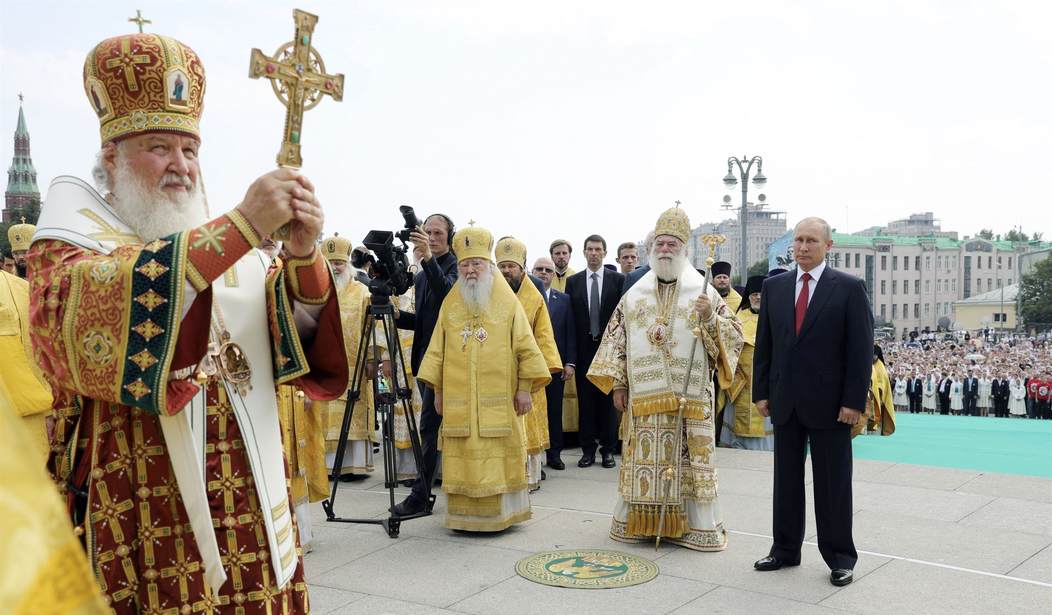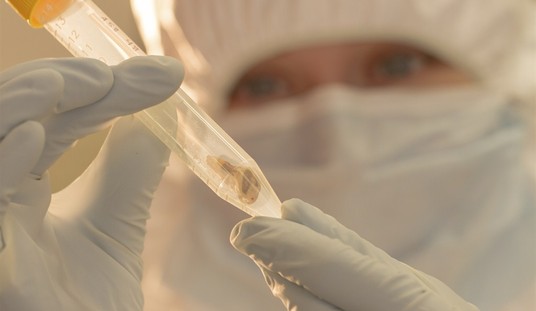If Russian Orthodox patriarch Kirill had the love of God in mind, he might not have endorsed Vladimir Putin in the first place. Nevertheless, Christian leaders from around the world rebuked Kirill for increasingly strident homilies endorsing Putin’s invasion of Ukraine and urged him to return to his proper role of seeking peace. Dozens of leaders across the ecumenical spectrum in the US signed onto an open letter demanding that Kirill “intervene” to end hostilities immediately:
The open letter signed by the heads of denominations and charities, as well as prominent writers and activists, is an “earnest plea” that Kirill, who is believed to be close to President Vladimir Putin, use his “voice and profound influence to call for an end to the hostilities and war in Ukraine and intervene with” Russian authorities to do so.
During a sermon on March 5, Kirill echoed Putin’s propaganda that Ukraine was engaged in the “extermination” of Russian loyalists and described the war as a spiritual struggle against the West’s “so-called values,” including LGBT indoctrination, Georgetown University and Center on Faith + Justice noted in a statement announcing the letter.
In response, the statement said, Christian leaders told Kirill, “We are in the season of Lent. In that Lenten spirit, we ask you to prayerfully reconsider the support you have given to this war because of the horrendous human suffering it has unleashed.” …
The signatories include: the Rev. Walter Kim, president of the National Association of Evangelicals; Sister Donna Markham, president and CEO of Catholic Charities USA; Bishop Teresa Jefferson-Snorton, president of Churches Uniting in Christ of board chair of the National Council of Churches; and the Rev. Teresa Hord Owens, president of Christian Church (Disciples of Christ) in the U.S. and Canada.
In another sermon on Wednesday, Kirill doubled down on the “mission from God” explanation and insisted that the West was attacking Russia rather than the other way around:
On March 6, when the Russian Orthodox Church observed “Forgiveness Sunday” before the beginning of their Lent, Kirill backed separatists in Ukraine’s eastern Donbass region and suggested that an unnamed western body of nations is organizing genocide campaigns against countries that refuse to hold gay pride parades.
On March 9, during the Lenten Liturgy of Presanctified Gifts, Kirill delivered another sermon in which he referred to Russians and Ukrainians as “one people” and accused the West of supplying Ukraine with weapons in a bid to weaken Russia out of a growing fear of how powerful Russia had become.
It doesn’t appear that Kirill’s too concerned about the peace of Christ at the moment. It doesn’t appear that way to European church organizations, either, which followed up with a demand letter of their own. Those demands came from fellow Russian Orthodox clerics as well as Catholics and others, reports Crux’ Inés San Martin:
According to the Metropolitan of the Archdiocese of Orthodox Churches of Russian Tradition in Western Europe, “our very unity is threatened” by the situation that arose following Russia’s “military intervention” and “violent attack” on Ukraine.
Meanwhile, the president of the Commission of the Bishops’ Conferences of the European Union (COMECE) said Kirill should take to heart his own remarks: “The Church can be a peacemaking force.” …
In a similar vein, Metropolitan John of Dubna, Archbishop of the Orthodox Churches of Russian Tradition in Western Europe, on Thursday asked Kirill to intervene in favor of peace. …
He then criticized Kirill’s March 6 homily in the Patriarchal Cathedral of Christ the Savior. During his remarks, the patriarch implied that this “war of cruel and murderous aggression” is justified as a “metaphysical battle,” in the name of “the right to stand on the side of the light, on the side of God’s truth, of what the light of Christ reveals to us, his word, his Gospel.”
With all the respect “due to you, and from which I do not depart,” but also “with infinite pain,” the metropolitan writes, “ I must bring to your attention that I cannot subscribe to such a reading of the Gospel.”
Those are harsh words, which come at the same time that Kirill faces an unprecedented revolt in the ranks of his own church.
That choice has not gone unnoticed at The Vatican, either. The second-ranking official at the Holy See publicly scolded Kirill on Thursday, in a rare criticism of another ecumenical partner. Secretary of State Cardinal Pietro Parolin also rebuked Russian foreign minister Sergei Lavrov:
Francis’ No. 2 at the Vatican, Cardinal Pietro Parolin, spoke candidly about the repercussion of Kirill’s remarks. “Kirill’s words do not favor or promote an agreement. Instead, they risk heightening spirits toward an escalation and not solve the crisis peacefully,” Parolin, who heads the Vatican Secretariat of State, said at an event in Rome on Wednesday.
Asked about the possibility of a meeting between Francis and Kirill, the cardinal said that “the situation is complicated by the tensions that exist between the churches, so at the moment there hasn’t been the opportunity” to plan a meeting.
Parolin spoke to Russian Foreign Minister Sergey Lavrov earlier this week but said he “was given no reassurance” by Moscow concerning the protection of civilians in Ukraine and seemed to express doubts about the possibility of a peaceful solution to the conflict.
That’s not the only signal coming out of the Vatican. Pope Francis made a special point of demonstrating solidarity with the Ukrainian Orthodox Church, which technically remains subsidiary to Kirill but will likely demand recognition as an independent entity as a result of this war. The pontiff might be tipping his hand in that direction, which the Patriarch of Constantinople has already endorsed:
With ecumenical and diplomatic channels seemingly exhausted, Francis sent two Vatican officials, Cardinal Michael Czerny and Cardinal Konrad Krajewski, to the border with Ukraine as representatives of the pope with the mission to help immigrants, promote peace and rekindle dialogue with the local churches.
Krajewski, the papal almoner, spoke with the head of the autocephalus church of Ukraine, Epiphanius, online on Tuesday and expressed the closeness of the Vatican and Pope Francis with the suffering people of Ukraine.
The Vatican’s outreach to Moscow has been complicated by its warming relations with Ecumenical Patriarch Bartholomew I, archbishop of Constantinople, who is considered the “first among equals” of the Eastern Orthodox patriarchs and who has visited the Vatican repeatedly and attended Catholic events. In 2019, Bartholomew recognized the Orthodox Church of Ukraine as an independent entity, formalizing its split from Moscow and creating a breach with Kirill.
Vatican and Russian Orthodox officials had wanted to bring Kirill and Francis back together again soon in an attempt to bring the two churches closer together. Now they couldn’t possibly be farther apart. The net result of Kirill’s endorsement for Putin’s war crimes will most likely be a dismembering of the Russian Orthodox Church, split between those loyal to the Gospels and those loyal to Kirill’s personal savior in Vladimir Putin. If and when the Russians seize Ukraine, expect retaliation against the Ukrainian Orthodox Church on a massive scale — a return to martyrdom, most likely, because Kirill wasn’t courageous enough to make a stand against Putin’s imperial ambitions.








Join the conversation as a VIP Member